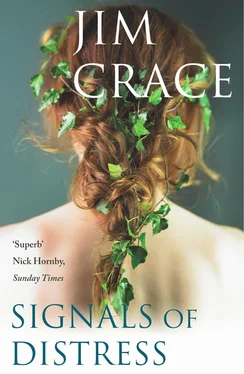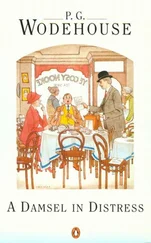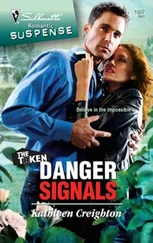He climbed on to the wall. It was wide and flat enough on top to be a path. Someone had walked that way before, and many times. The undergrowth was flattened. Roots were snapped. The loosest rocks had been knocked on to the earth below the wall-top path. Aymer followed it, leaping over branches, glad to be out of the mud, and benefiting from the last of the daylight and the low light of the moon. The whole length of his body was reliefed against the sky. He looked as if he was ten feet tall, a comic, skinny stilts-man at a fair, with performing dog. A stringy hedgerow ghost. A diabolic scarecrow on the move. He found a route around the patchwork of the fields towards the smoke and hut, and came at last into the corner of a field that had been tilled and turned for winter. It looked at first like a landscape of ten thousand lakes; the mountains were the ridges in the earth; the valleys, furrows; the narrow pools, each shaped like icy mouths, reflecting all the silver in the sky. Again, it looked as if some fairy silversmith had dropped a cargo of brooches, or tried to plant the soil with polished, metal leaves. Was Aymer looking down on shards of ice? He walked along the wall a little further, so that the shards, the lakes, the leaves, the brooches, could be seen more clearly. He focused on the smell, before he focused on the ground. He knew it well. The field was full of fish. The sea was taking everyone away, and putting fish on land. There were no leaves or lakes or brooches, just one star-gazy pie with a four-acre crust of earth and a shoal of pilchards staring at the moon, their eyes as dead as flint, their scales like beaten tin, their fraying fins and tails like frost, their flesh composting for the next year’s crop. The field was absolutely still. The fastest movements were the snails and slugs which were enamelling the fleshy silverwork with their saliva trails.
Whip and Aymer jumped into the field. Whip nosed about, then started eating. Aymer squatted on his heels, and backed against the wall. The fish had frightened him. Where was the order in the universe? How long before the sky was tumbling with frogs and rats? How long before the ears of corn had fins? He’d never known such superstitious, concentrated fear, nor ever felt so far from home. He thrust his hands into his coat. He shut his eyes. He hung his head towards his knees. This expedition had been mad.
A scuffle thirty yards away made him look up once again. At first he thought it was the dog. But Whip was standing in the middle of the field, her nose pointing, her chin greasy with pilchards, her neck hairs hackling. She’d heard the scuffle too. There was some movement on the far side of the field, ten yards below the little hut and its twist of smoke. Some shadows shifting. Some interruptions to the glinting silver of the fish. Aymer could convince himself he saw someone, crouching in the furrowed soil, pushing pilchards in his mouth. Aymer could convince himself by now that there were wolves or hobgoblins or sharks. But Whip wasn’t afraid. She sped across the moonlit pilchard pie and gave chase to a feeding nest of rats.
Aymer found himself a broken length of branch and followed Whip. The smell of rotting fish was soon displaced by that of wood smoke, drier and more bitter. What fire there was hadn’t been fed for quite a while. Its fuel was mostly root and bark and tough billets of thorn. Its grate — hidden up against the north side of the hut — was made from slates and stones that had been dislodged from the roof and walls. There was a flat slate in the ashes, with fish bones. Someone had cooked a meal. It was instinctive: Aymer crouched again; he blew into the fire to try and raise a flame. He got the embers to glow, but there was nothing for their heat to curl and burst around. He searched his pockets, took out the book, and fed some of the Truismes by dell’Ova to the fire. The pages lifted, stiffened, blackened, smoked. He tore more pages into tiny shreds, like kindling. He blew again until the hot eye of the fire lifted up its lid and winked a tiny flame. The fire grew strong on aphorisms, epigrams and teasing ambiguities, in French. Aymer’s face and hands were glowing now. His pulse had slowed. His blood was warm. He added more wood to the fire. The smoke was damp.
He rolled the last remaining pages of his book into a torch. The ink burned blue. He held the torch up to the broken wall of the hut. It might have been the refuge from the rain a dozen years before for cattle boys. It might have been a winter sty for pigs. Or some hidden place that smugglers used. There was a tiny room inside, not five feet high, not six feet long, not fully roofed, no proper floor, but snug. Half of the ground was covered in dry bracken. There was a cup, a metal box, a demijohn, some more fish bones. Aymer stooped and went inside. He opened the metal box: some candle ends, an apple core, some cheese, some hardbake, a button, a teaspoon, an empty pot of Dr Sweetzer’s Panacea for Salving Wounds and Burns. No pistol. Aymer lit one of the candle ends, and stamped his torch out on the earth. He put the candle on the metal box, and searched the bracken bed. No pistol there. No body warmth. No blood. No anything. The blanket hanging from the wall was invisible, until Aymer almost fell and had to steady himself. Then he felt the cheap perpetuanna of the woollen cloth, and took it down off its twig peg. It was a horse blanket — and like the ones used in the stable and the tackle room at the inn.
Aymer went outside, stood straight, and slowly turned a full circle, looking for the outlines of a man. He dared not call. The landscape of his circle ducked and ridged and plunged as walls gave way to trees, and trees arched weatherways towards the moors, and moors descended into fields and back again to walls and down onto the galaxy of fish. The only light was moon. The only life was Whip’s.
Aymer waited for an hour, the horse blanket wrapped around his shoulders and his head, until his fire was almost dead. He tried to find a place for Otto in his life, to make amends inside his head at least, to revive the harmony he’d squandered. Whip snoozed, one-eyed, her fur just inches from the embers. It seemed much later, but it wasn’t yet eight o’clock and he might still be back in time for supper at the inn. He woke the dog, found his broken branch, returned the blanket to its peg, put all his change into the metal box — three shillings and a farthing — and climbed again onto the highway of the wall. The moon provided enough light, if he was careful. The branch was helpful as a walking stick. He wasn’t certain of the way. There were too many crossroads in the walls. Too many junctions. And, this time, no wisp of smoke to mark his destination. He tried to listen for the sea, but it wasn’t as noisy as the wind. At last he found a policy. The wind would come up off the sea at night. The warm attracts the cold. If he could follow routes that led into the wind then he must come finally to the wagon way. Then turn left for Wherrytown.
He found a wall that ran into the wind. He hadn’t taken more than a dozen steps when he saw a light ahead. Was it a building on the edge of town? A marker on the chapel? He waited and watched, holding his breath, holding his cudgel-branch. The light was moving parallel to him and in a straight line. And then it took a sudden right-angled turn and was coming, more or less, towards Aymer. It moved from side to side, like a porch light swinging on its hook. Aymer made himself as small as possible. He pushed Whip down onto the wall and held her muzzle and her back. Again the light went right, and then resumed another path towards Aymer and the dog. Someone else was walking along the network of the walls, with a lantern. It wasn’t bravery, but cold and cowardice that made Aymer stand up and call out, ‘Who goes there?’ Such a foolish and dramatic phrase! He even blushed. There was no reply. Perhaps the wind had shredded his words and scattered them inland. This time he called out, ‘Hello. It’s Aymer Smith,’ and then, ‘I’m only lost.’ He could now make out the silhouette of a small man, walking on the wall with the certainty of a goat. The lantern was fifty yards away when Aymer recognized the busy and ironic walk of George the parlourman.
Читать дальше












